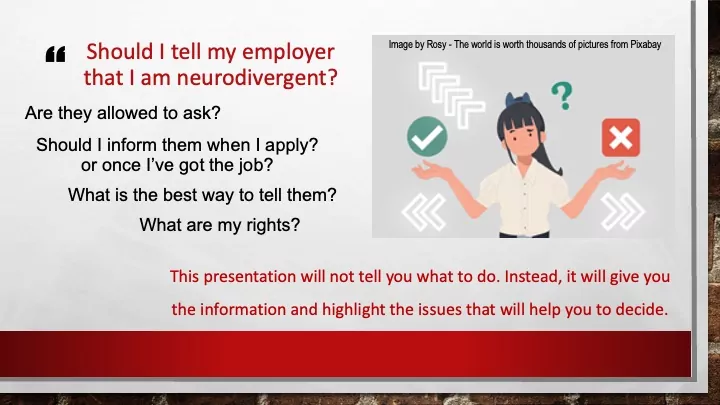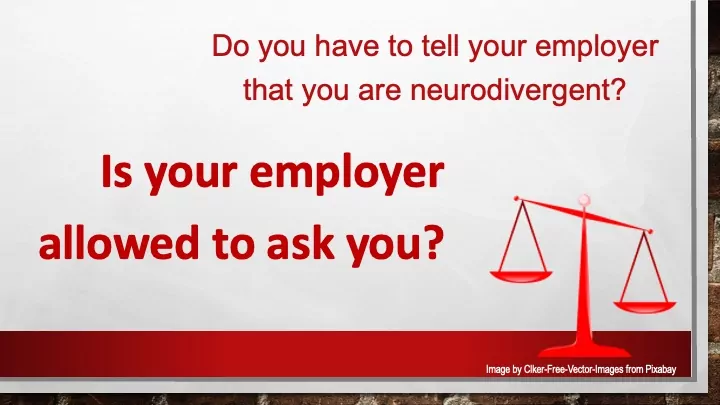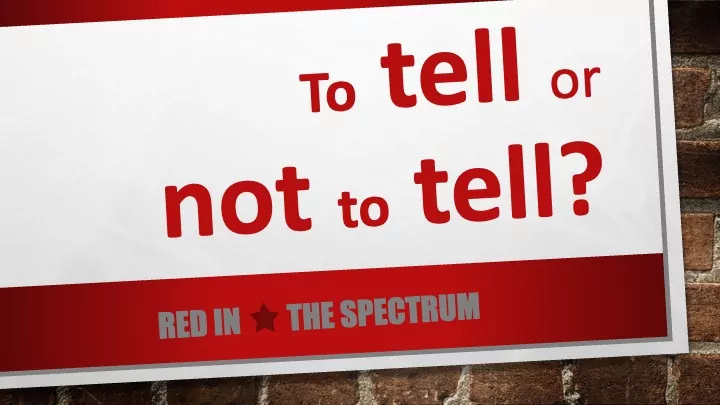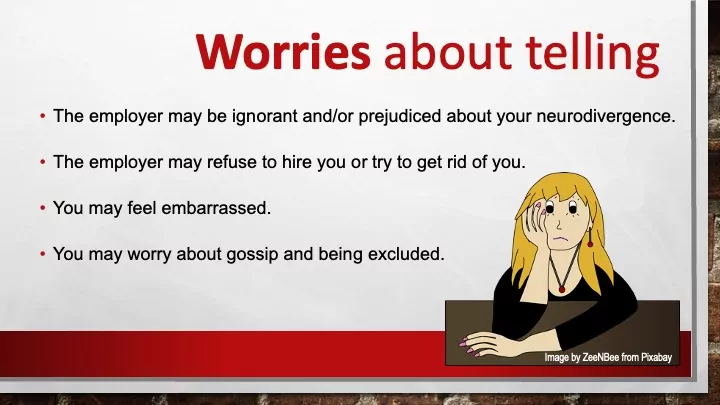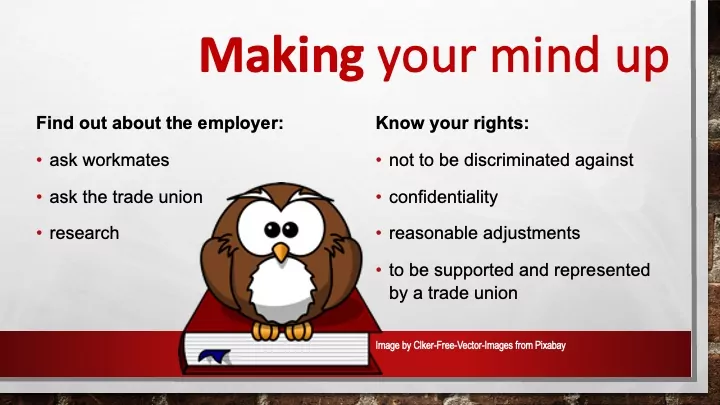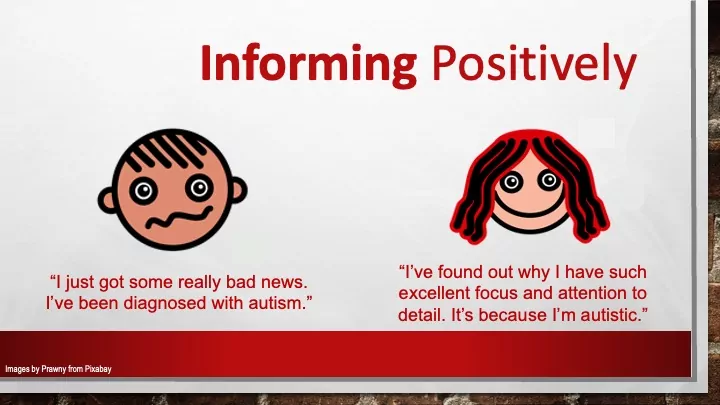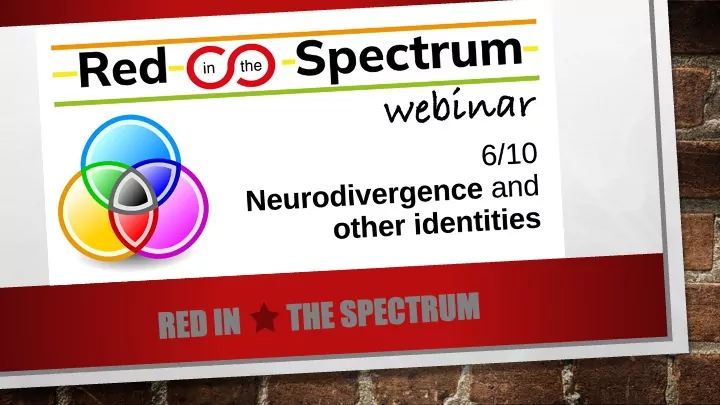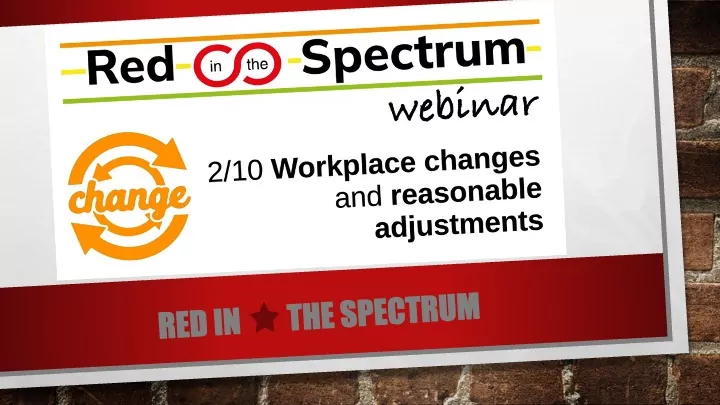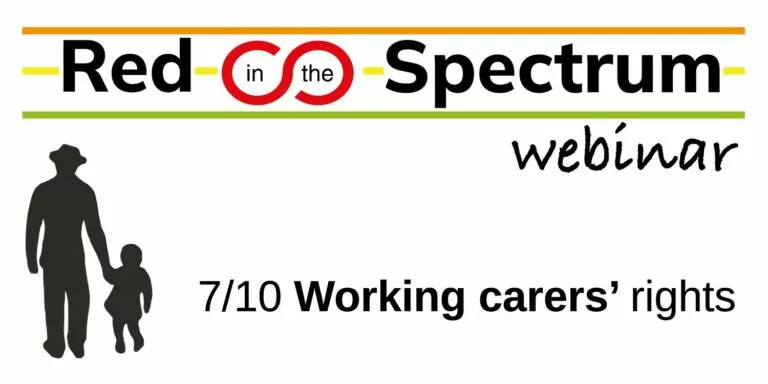To tell or not to tell an employer that I am neurodivergent? Webinar 3
Yesterday (Sunday 28 January), Red in the Spectrum held the third in our series of ten Sunday evening Neurodiversity at Work webinars, on the subject of ‘To tell or not to tell?’.
The webinar presented issues and ideas about whether and how to tell an employer that you are neurodivergent, which are reproduced below. Participants contributed their thoughts and their experiences of what happened when they did tell an employer, by speaking, posting in the chat, and through Slido.
This post contains the information given in the webinar presentation and some of the contributions from participants.
Should I tell an employer that I am neurodivergent?
- Are they allowed to ask?
- Should I tell an employer when I apply for a job?
- or once I’ve got the job?
- What is the best way to tell them?
- What are my rights?
This presentation will not tell you whether or not to tell an employer. Instead, it will give you the information and highlight the issues that will help you to decide.
Poll: If you are neurodivergent, have you told your current employer?
Yes, and I’m glad that I did – 50%
Yes, and I wish I hadn’t – 25%
No – 25%
I am not currently employed – 0%
Participants’ comments:
Yes, but the result has been pretty neutral unless they need a ‘different’ person for a photo shoot.
Glad in some ways but not in others
I generally don’t have to tell ’em. They work out I’m ‘a bit spectrummy’ quite rapidly!
To tell or not to tell an employer? What does the law say?
- Do you have to tell an employer that you are neurodivergent?
- Is your employer allowed to ask you?
The law says:
- It is unlawful for an employer to ask any job applicant about their health or disability unless and until the applicant has been offered a job.
- It is also unlawful for an employer’s representative (eg. occupational health provider) to ask a job applicant questions about their health or disability.
- Questions about previous sickness absence are classed as questions that relate to health or disability and must not be asked.
But an employer may ask about disability:
- to establish whether the applicant can take part in an assessment
- to determine whether reasonable adjustments can be made to enable a disabled person to take an assessment
- to find out whether a job applicant can undertake a function intrinsic to the job
- to monitor diversity among job applicants
- to support ‘positive action’ in employment for disabled people
- if there is an occupational requirement for the person to be disabled.
Do you have to tell an employer that you have a neurodivergent condition:
- when you apply for a job or promotion?
- once you have the job?
- if you are diagnosed while already in a job?
NO!
To tell or not to tell an employer?
Advantages: If you tell an employer …
- Your employer and workmates may understand you better.
- You can ask for changes to the way you work to suit the way you think.
- You may feel less stressed.
Comment: “Advantage – you are not judged negatively for not being something that you can’t be (neurotypical).”
Some examples of positive outcomes when a neurodivergent worker did tell an employer:
- “I told my manager I’m autistic. Surprisingly, her first questions were about how to help, my needs, and what she should expect and look for. Only after did she ask about how it would affect my performance. Good signs.”
- “I ended up telling my boss that I am neurodivergent and that I need clearer communication in order to do my job. He was super understanding, called me right away and we now have a daily check-in meeting to go over questions.”
- Mary found out that she is dyspraxic at age 32 and dyslexic at age 45. She finds change difficult. Her manager knew that Mary had to have plenty of warning of change and to have the impact of change minimised, so she avoided moving Mary when reorganising and when change was necessary, was prepared for Mary to be emotionally labile.
- “Despite my initial concerns about how my manager would react – would I be taken off safety-critical duties? – I’ve received nothing but support. It’s clear to him, and to me, that whatever my exact condition, I can do the job I do with no need for concern.”
Another advantage:
If you count as disabled under the law, your employer has to:
- protect you from discrimination
- make reasonable adjustments
Are you disabled?
- Neurodivergent people are not automatically considered disabled.
- Disabled: you have a physical or a mental impairment which has a substantial and long-term impact on your ability to do normal day to day activities.
- If you submit a claim of disability discrimination, your employer can contest that you are disabled under the terms of the law.
- A formal diagnosis is not decisive.
To tell or not to tell an employer?
If you tell an employer, you may worry that:
- The employer may be ignorant and/or prejudiced about your neurodivergence.
- The employer may refuse to hire you or try to get rid of you.
- You may feel embarrassed.
- You may worry about gossip and being excluded.
Some examples of negative experiences when a neurodivergent worker did tell an employer:
- “At my interview, I told the employer I am dyspraxic. The interviewer reassured me this would not be a problem. I got the job. I was never asked what adjustments could be made for me. My manager refused to train me properly, and treated me differently from other staff. He only spoke to me to tell me I was doing something wrong.”
- Kathy told her manager that she is dyspraxic, but he did not know what dyspraxia is and did not find out. He told Kathy not to make excuses for poor performance and that he may take disciplinary action.
- “Even after my autism diagnosis, not once did my boss ask me if there was anything I needed to be changed or adapted to help me.”
- “I only told my manager and my personal buddy about my autism, but they decided to give the whole team Asperger Awareness Training with me out of the room.”
To tell or not to tell an employer? Making your mind up.
Consider the pros and cons of telling your employer.
Discuss with an ally whether to tell an employer:
- friend or family
- trade union representative
- neurodivergent organisation
Find out about the employer:
- ask workmates
- ask the trade union
- research
Know your rights:
- not to be discriminated against
- confidentiality
- reasonable adjustments
- to be supported and represented by a trade union
To tell or not to tell an employer? Participants’ experiences:
Big organisations worry about reputational issues if you are in a position of authority and autistic. I disclosed but not for many years.
They sent me to Occupational Health, who said that as I had managed ok in my job up until now, I didn’t need any adjustments, even though I had asked for some.
I’m constantly in trouble for ‘making other people look bad’. Turns out, it gets you into even more trouble with HR if you point out that it’s their work that makes them look bad!
I had the classic “Isn’t everyone a bit autistic?”.
I was meeting a Job Coach after being made ‘redundant’ following ‘not fitting in’ and declining to be cured of autism after a visit to Occupational Health.
I was pushed out of my last job. (I’d told colleagues I was autistic outside of work hours. Mistake.)
I have had an eight-month long HR battle where they commissioned a ‘mediation’ and then hid the report and tried to blame me for not participating in an Occupational Health meeting when they had sent the wrong paperwork.
I disclosed, but soon after was attacked on the basis of being autistic because some people objected to work I had done because it showed up gaps in their processes.
They said “that’s good to know”, but I felt it was said with an undertone of being condescending and perhaps seeing me differently.
I think that if you tell employers that you are neurodivergent, it might be an advantage for lower-level positions, often because the organisation wants their workplace statistics to look good, but then I think it might be a disadvantage to tell them if you’re applying for higher-level positions.
I have had nothing but awful stuff happen. In one instance a manager (not my manager, one I shared an office with) sent their boss a message that I was not ‘fitting in’ – and this senior person tried to have me sacked (and I was not made aware of that until made redundant – they got me in the end …)
My manager said she had not supported anyone with dyslexia before. I was put off Access to Work by the employer but after two years of misery applied and have just had an assessment.
I told them when I applied and it helped me be a lot less anxious in the interview because I knew they were taking it into account. I think that’s why I got the job.
Tokenism on occasions.
It’s kind of how I got this current job, through Job Coach. I told them off for a dodgy application process, gave ’em an impromptu presentation on autism and got told I should apply for a teaching job in the firm.
Had some people steer clear of me and go from talking to me to not. Some were curious, others didn’t go near it.
I did get support but had to wait over four months to get an Access to Work assessment. I received all sorts of tools and training, also work coaching sessions.
Access to Work support, immediate adjustments like noise cancelling headphones.
I am often in trouble for being too open. Regularly have to argue that it is not ‘unprofessional’ to disclose to patients or students.
Always introduce yourself with autism but tell them you’re not going to read their mind.
Nothing happened. He just said “OK”.
I am open about being autistic with my colleagues but that is my choice because I want to be able to advocate for other neurodivergent people. It is also possible because I have worked there a long time and I am well respected.
Sometimes it’s about being a role model.
You shouldn’t have to explain it to folks as well; that’s exhausting.
To tell an employer? Reasonable adjustment passports
One participant commented that “It’s frustrating that every time I get a new manager I have to declare my autism again and explain what I need. It doesn’t seem to be written down in any central place. HR say it’s the disabled person’s responsibility to declare to each manager. It’s always been positive but it’s hard.”
This illustrates the case for ‘reasonable adjustment passports’ (see notes from last week’s webinar).
Another participant showed the value of this from their own experience: “Got one. Moved department. New line manager, new HR person. Passport turned out to be very handy.”
To tell or not to tell an employer? Informing positively
- Instead of: “I just got some really bad news. I’ve been diagnosed with autism.”
- Tell an employer: “I’ve found out why I have such excellent focus and attention to detail. It’s because I’m autistic.”
- Instead of: “Sorry I didn’t tell you before, but the reason I’ve been making all these mistakes is because I’m dyslexic.”
- Tell an employer: “I’ve realised that, as a dyslexic person, I could do my job better with assistive software.”
- Instead of: “I think I need to tell you that I have ADHD, as that will probably be a problem for you.”
- Tell an employer: “I have a lot of energy and am good at solving problems. That’s because I have ADHD, which also means I will benefit from taking frequent, short breaks.
There are seven more webinars in the series – you can attend whichever ones are most interesting and relevant to you.
Whether you attended this week or not, we hope to see you at some point over the next seven weeks.
Next week, we will be discussing Neurodivergent Workers’ Legal Rights. Register here.

